Acute stress disorder is a mental disorder that develops after an intensely traumatic experience. If left unaddressed, it can lead to more severe conditions such as post-traumatic stress disorder.
What Is Acute Stress Disorder?
Acute stress disorder (ASD) is a psychological reaction to an unexpected, traumatic, or life-threatening experience[mfn] Fanai, M., & Khan, M. (2022). Acute Stress Disorder. In StatPearls. StatPearls Publishing. Available from: https://www.ncbi.nlm.nih.gov/books/NBK560815/ [/mfn]. The reaction is usually dysfunctional and persists for at least three days up to a month.
First introduced in DSM-IV [mfn] Bryant, R. A., & Harvey, A. G. (2000). Acute stress disorder: A handbook of theory, assessment, and treatment. American Psychological Association. Available from: https://www.apa.org/pubs/books/431737A?tab=1 [/mfn] as a diagnostic category in 1994, ASD is also known as acute stress reaction or psychological shock. The term ‘acute’ refers to the fact that the symptoms develop almost immediately after the stressful event, but usually do not last long.
Around 13-21% of car accident survivors and 20-50% of survivors of mass shootings, rape, and assault are estimated to develop acute stress disorder.
In fact, the United States Department of Veterans Affairs [mfn] VA.gov | Veterans affairs. (n.d.). PTSD: National Center for PTSD Home. Available from: https://www.ptsd.va.gov/professional/treat/essentials/acute_stress_disorder.asp#two [/mfn] claims that about 19% of people surviving a traumatic event develop ASD. Moreover, about 50% of people suffering from acute stress disorder also go on to develop post-traumatic stress disorder (PTSD).
Case Example
Prachi (a 24-year-old woman) had recently been in a car accident with her driver who had unfortunately sustained grave injuries. Prachi was fortunate to have suffered only minor bruises.
About a week later, Prachi started feeling quite low. She was not sure if this was related to what had happened. In fact, she could barely remember the details of the accident and even avoided thinking and talking about it.
She had, however, been experiencing recurrent nightmares of dying and was unable to sleep properly at night. Moreover, she experienced a wave of panic every time she stepped into her car.
Soon, Prachi felt unable to function in her everyday life due to sudden intrusive thoughts about the accident and felt as though she was going crazy.
However, on consulting a psychologist, Prachi understood that she was suffering from acute stress disorder, a reaction to trauma that was more common than she had imagined.
Acute Stress Disorder vs PTSD
Most of the symptoms of acute stress disorder are similar to that of post-traumatic stress disorder, as both these conditions develop after a traumatic event. However, the time of symptom onset is what majorly distinguishes ASD and PTSD.
Acute stress disorder is diagnosed when the symptoms have been present for 3 to 30 days after the triggering event, whereas post-traumatic stress disorder is diagnosed if they persist for more than a month. However, it can often be difficult to distinguish between ASD and PTSD, owing to their complexity [mfn] Stavropoulos, K. K., Bolourian, Y., & Blacher, J. (2018). Differential Diagnosis of Autism Spectrum Disorder and Post Traumatic Stress Disorder: Two Clinical Cases. Journal of clinical medicine, 7(4), 71. https://doi.org/10.3390/jcm7040071 [/mfn].
Research has revealed that ASD can increase a person’s vulnerability [mfn] Bryant R. A. (2011). Acute stress disorder as a predictor of posttraumatic stress disorder: a systematic review. The Journal of clinical psychiatry, 72(2), 233–239. https://doi.org/10.4088/JCP.09r05072blu [/mfn] to PTSD but diagnosing and treating it at the earliest can help prevent it.
Read More About Post-traumatic Stress Disorder Here
Acute Stress Disorder vs. Adjustment Disorder
While both acute stress disorder and adjustment disorder are reactions to stressful situations, the latter mostly occurs in response to a significant life change, such as being subject to a new environment, being diagnosed with a chronic illness, losing a job, etc.
The nature of stressors as well as the time of onset is of crucial significance when distinguishing between the two disorders. Adjustment disorder can develop within 3 months of the triggering event [mfn] Patra, B. N., & Sarkar, S. (2013). Adjustment disorder: current diagnostic status. Indian journal of psychological medicine, 35(1), 4–9. https://doi.org/10.4103/0253-7176.112193 [/mfn], as per DSM 5. On the other hand, acute stress disorder is a more immediate reaction to trauma.
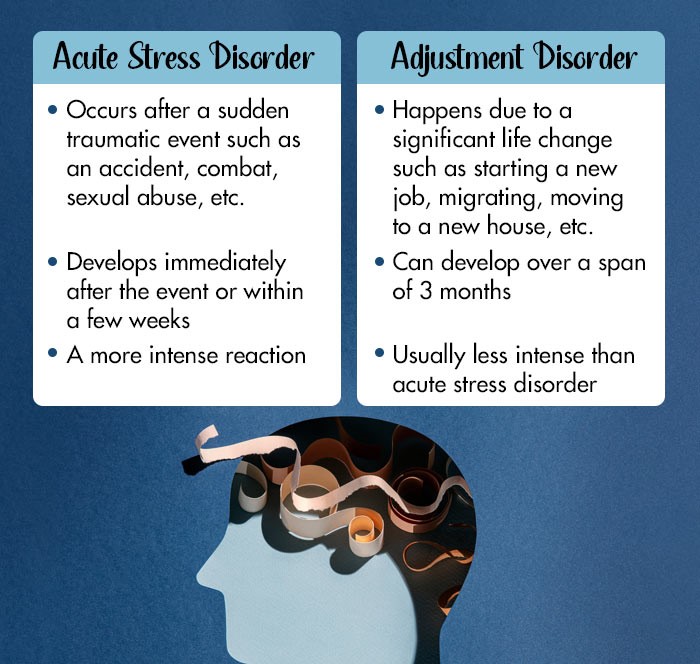
Read More About Adjustment Disorder Here
Acute Stress Disorder vs. Brief Psychotic Disorder
Both acute stress disorder and brief psychotic disorder are short-term responses to stress. However, their manifestations are quite different. While the former is a neurotic reaction, the latter is characterized by typical symptoms of psychosis [mfn] Stephen, A., & Lui, F. (2022). Brief Psychotic Disorder. In StatPearls. StatPearls Publishing. Available from: https://www.ncbi.nlm.nih.gov/books/NBK539912/ [/mfn], such as hallucinations, delusions, and disorganized speech.
Know More About Psychosis Here
Signs Of Acute Stress Disorder
Acute stress disorder symptoms can be divided into five different categories [mfn] Substance Abuse and Mental Health Services Administration. (2016). Impact of the DSM-IV to DSM-5 Changes on the National Survey on Drug Use and Health. Substance Abuse and Mental Health Services Administration (US). Available from: https://www.ncbi.nlm.nih.gov/books/NBK519704/table/ch3.t30/ [/mfn].
1. Intrusion symptoms
These include recurring thoughts related to the traumatic event such as:
- Involuntary, distressing memories of the incident
- Recurrent nightmares about the incident
- Situations in which you feel as if the event is happening again
- Intense reactions to cues that represent the traumatic event
2. Negative mood
This involves a persistent feeling of sadness along with the inability to feel positive emotions, eg: joy, pleasure, etc.
3. Dissociative symptoms
People with ASD may also experience dissociation. Some of the common symptoms include:
- An altered sense of reality about your surroundings, for example, looking at yourself from a third person’s perspective, feeling of time slowing down, etc.
- A lack of memory about some part of the incident, also known as ‘dissociative amnesia.’
4. Avoidance symptoms
These symptoms can manifest as:
- Trying to avoid thinking about the distressing event
- Trying to avoid places, people, and other things that might trigger memories of the event
5. Arousal symptoms
Hypervigilance and hyperarousal are common symptoms of ASD. Some associated symptoms include:
- Sleep disturbances or insomnia
- Angry outbursts or irritable mood
- Difficulty concentrating
- Being easily startled
- High alertness
Physical symptoms
Apart from the symptoms mentioned above, acute stress disorder can have certain physical manifestations as well, which are usually a result of overactivity in the nervous system or caused due to stress hormones like adrenaline. Some of these symptoms are:
- Heart palpitations
- Chest pain
- Difficulty breathing
- Nausea
- Fatigue
- Stomach pain
- Headache
- Sweating
Sometimes, acute stress disorder causes depression, and gastrointestinal and rheumatic symptoms [mfn] Kavan, M. G., Elsasser, G. N., & Barone, E. J. (2012). The Physician’s Role in Managing Acute Stress Disorder. American Family Physician, 86(7), 643–649. https://www.aafp.org/pubs/afp/issues/2012/1001/p643.html [/mfn] as well. However, these usually tend to go away within a couple of weeks.
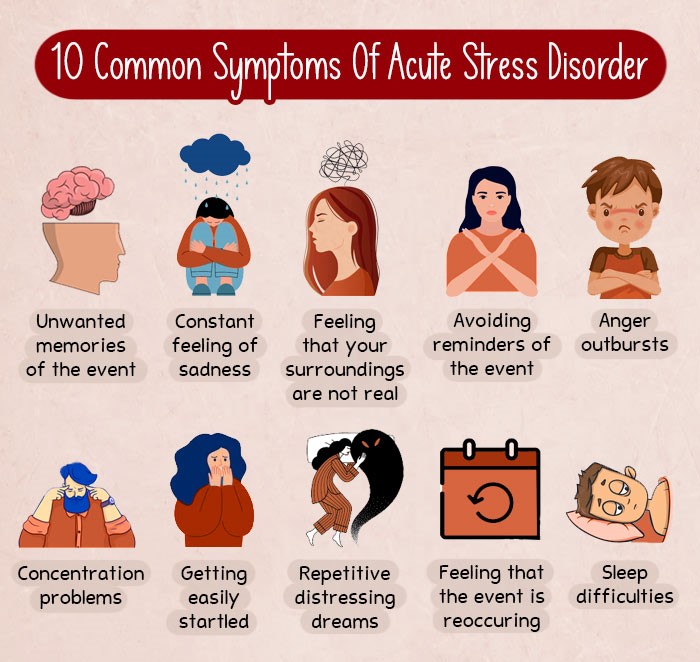
Causes Of Acute Stress Disorder
Witnessing or experiencing a deeply traumatic event may lead to the development of acute stress disorder. However, the likelihood of being affected by this mental condition may depend on the severity of the traumatic event.
Some possible traumatic events that may precede the onset of this disorder are:
- Natural disasters, like earthquakes, fires, or floods
- Accidents
- Domestic violence, physical or sexual assault, or rape
- Life-threatening injury or illness
- Sudden death of a loved one
- Witnessing a mass shooting or a murder
- Terrorist attacks or a combat
- An unexpected life crisis, etc.
Some risk factors can further increase your susceptibility [mfn] Sareen J. (2014). Posttraumatic stress disorder in adults: impact, comorbidity, risk factors, and treatment. Canadian journal of psychiatry. Revue canadienne de psychiatrie, 59(9), 460–467. https://doi.org/10.1177/070674371405900902 [/mfn] to acute stress disorder, such as:
- Genetic predisposition
- Being female
- Experience of abuse in childhood
- Personality disorders
- Intellectual disabilities
All of these risk factors are common to both ASD and PTSD as both disorders are closely linked.
Acute Stress Disorder Diagnosis
To be diagnosed [mfn] Substance Abuse and Mental Health Services Administration. (2016). Impact of the DSM-IV to DSM-5 Changes on the National Survey on Drug Use and Health. Substance Abuse and Mental Health Services Administration (US). Available from: https://www.ncbi.nlm.nih.gov/books/NBK519704/table/ch3.t30/ [/mfn] with acute stress disorder, you must first have either:
- Been exposed to a traumatic event
- Seen something traumatic happen to another person
- Come to know that someone close to you has suffered from something traumatic, or
- Been repeatedly exposed to unpleasant details regarding a traumatic event
Following this, you would have experienced at least 9 of the symptoms mentioned before from the five symptom categories, i.e., intrusion, negative mood, dissociation, avoidance, and arousal, within 3 to 30 days of the event.
Moreover, the symptoms should:
- Cause significant disturbances in your functioning, and
- Not be a result of substance use or any other illness
A mental health professional usually takes a detailed history of the symptoms along with other information regarding a person’s family and childhood before arriving at a diagnosis of acute stress disorder. Psychometric tools such as the Acute Stress Disorder Scale [mfn] Bryant, R. A., Moulds, M. L., & Guthrie, R. M. (2000). Acute Stress Disorder Scale: a self-report measure of acute stress disorder. Psychological assessment, 12(1), 61–68. [/mfn] are commonly used to assess the symptoms.
Acute Stress Disorder In Children
Children may also suffer from ASD after having gone through something traumatic. In fact, most children exposed to a traffic-related accident [mfn] Winston, F. K., Kassam-Adams, N., Vivarelli-O’Neill, C., Ford, J., Newman, E., Baxt, C., Stafford, P., & Cnaan, A. (2002). Acute stress disorder symptoms in children and their parents after pediatric traffic injury. Pediatrics, 109(6), e90. https://doi.org/10.1542/peds.109.6.e90 [/mfn] are likely to develop some symptoms of ASD. However, research [mfn] Kassam-Adams, N., Palmieri, P. A., Rork, K., Delahanty, D. L., Kenardy, J., Kohser, K. L., Landolt, M. A., Le Brocque, R., Marsac, M. L., Meiser-Stedman, R., Nixon, R. D., Bui, E., & McGrath, C. (2012). Acute stress symptoms in children: results from an international data archive. Journal of the American Academy of Child and Adolescent Psychiatry, 51(8), 812–820. https://doi.org/10.1016/j.jaac.2012.05.013 [/mfn] suggests that the diagnostic criteria for acute stress disorder in children may be more flexible in terms of the number of symptoms required to be fulfilled for diagnosis.
Treatment For Acute Stress Disorder
A lot of people suffering from acute stress disorder may not require any treatment at all as the symptoms often go away with time. However, professional help may be necessary when they are persistent and severe. Acute stress disorder treatment can involve psychotherapy, medication, or a combination of both.
Therapy
Cognitive behavior therapy [mfn] Bryant, R. A., Harvey, A. G., Dang, S. T., Sackville, T., & Basten, C. (1998). Treatment of acute stress disorder: a comparison of cognitive-behavioral therapy and supportive counseling. Journal of consulting and clinical psychology, 66(5), 862–866. https://doi.org/10.1037//0022-006x.66.5.862 [/mfn] is the most well-researched method of treatment for acute stress and other disorders related to stress and anxiety. A trauma-focused CBT approach involves exposure, cognitive restructuring, and patient education.
An early provision of cognitive behavior therapy for acute stress disorder can also prevent PTSD [mfn] Bryant, R. A., Sackville, T., Dang, S. T., Moulds, M., & Guthrie, R. (1999). Treating acute stress disorder: an evaluation of cognitive behavior therapy and supportive counseling techniques. The American journal of psychiatry, 156(11), 1780–1786. https://doi.org/10.1176/ajp.156.11.1780 [/mfn] effectively.
Some other therapy options for acute stress disorder include:
- Supportive counseling
- Exposure-based therapies
- Relaxation techniques [mfn] Scotland-Coogan, D., & Davis, E. (2016). Relaxation Techniques for Trauma. Journal of evidence-informed social work, 13(5), 434–441. https://doi.org/10.1080/23761407.2016.1166845 [/mfn]
- Hypnotherapy, etc.
Medication
Although medication is not considered the first-line treatment [mfn] Benedek, D. M., Friedman, M. J., Zatzick, D., & Ursano, R. J. (2009). Guideline Watch (March 2009): Practice Guideline for the Treatment of Patients with Acute Stress Disorder and Posttraumatic Stress Disorder. FOCUS, 7(2), 204–213. https://doi.org/10.1176/foc.7.2.foc204 [/mfn] for acute stress disorder, anticonvulsants, or antidepressants may be prescribed in extreme cases.
The World Health Organization (WHO [mfn] Guidelines for the Management of Conditions Specifically Related to Stress. (2013). World Health Organization. Available from: https://pubmed.ncbi.nlm.nih.gov/24049868/ [/mfn]) has advised against prescribing sleeping pills or anti-anxiety drugs like benzodiazepines for the treatment of ASD in adults. If prescribed at all, they are used for immediate and short-term relief only.
Self-Help For Acute Stress Disorder
Self-care is a crucial aspect of the treatment and recovery process. Some ways to ensure faster recovery for ASD are as below:
- Follow a nutritious diet [mfn] Bremner, J. D., Moazzami, K., Wittbrodt, M. T., Nye, J. A., Lima, B. B., Gillespie, C. F., Rapaport, M. H., Pearce, B. D., Shah, A. J., & Vaccarino, V. (2020). Diet, Stress and Mental Health. Nutrients, 12(8), 2428. https://doi.org/10.3390/nu12082428 [/mfn]
- Exercise regularly [mfn] Hamer, M., Endrighi, R., & Poole, L. (2012). Physical activity, stress reduction, and mood: insight into immunological mechanisms. Methods in molecular biology (Clifton, N.J.), 934, 89–102. https://doi.org/10.1007/978-1-62703-071-7_5 [/mfn]
- Have a healthy sleep schedule [mfn] Harvey, A. G., Jones, C., & Schmidt, D. A. (2003). Sleep and posttraumatic stress disorder: a review. Clinical psychology review, 23(3), 377–407. https://doi.org/10.1016/s0272-7358(03)00032-1 [/mfn]
- Refrain from consuming alcohol or drugs
- Seek support from your friends and family
How to help a loved one with ASD?
If a family member or a friend is suffering from acute stress disorder, here are a few things you can do to help them cope with the condition:
1. Listen to them. Do not belittle their struggles or compare them to your own.
2. Encourage them to seek help and help them follow through with the treatment.
3. Offer support in whatever way you can, be it financial, emotional, or any other act of service.
4. Have patience and faith in the recovery process. Let them know that they can take their time to get over the trauma and that you will be there for them.
5. Give them the space they need. For instance, if your partner feels uncomfortable with intimacy after having faced some kind of abuse, be willing to trust and wait for them.
Takeaway
Acute stress disorder is a common mental illness that can be overcome with the help of adequate treatment and support. Learning about ASD and PTSD can help the suffering person and enable their friends and family to provide better support leading to complete recovery.
At A Glance
- Acute stress disorder (ASD) is a psychological reaction to a sudden traumatic event.
- It is important to distinguish ASD from other disorders such as PTSD, adjustment disorder, and brief psychotic disorder.
- The symptoms of acute stress disorder can be divided into 5 categories- intrusion, negative mood, dissociation, avoidance, and arousal.
- ASD may be caused by a variety of factors relating to both heredity and environment.
- ASD treatment mainly involves trauma-informed cognitive behavioral therapy, although medications may be used in severe cases.
- It is important to practice self-care to speed up the recovery process.
Frequently Asked Questions (FAQs)
1. How long does acute stress disorder last?
Acute stress disorder can last for about a month. If it persists for longer than that, it cannot be classified as ‘acute’ but is diagnosed as post-traumatic stress disorder.
2. Who are some famous people with acute stress disorder?
Several well-known personalities such as Oprah Winfrey and Lady Gaga have come out with their stories of trauma and stress disorders.
3. Who is at most risk for acute stress disorder?
People who have been previously diagnosed with psychiatric disorders [mfn] Taymur, İ., Sargin, A. E., Özdel, K., Türkçapar, H. M., Çalişgan, L., Zamki, E., & Demirel, B. (2014). Possible Risk Factors for Acute Stress Disorder and Post-Traumatic Stress Disorder After an Industrial Explosion. Noro psikiyatri arsivi, 51(1), 23–29. https://doi.org/10.4274/npa.y6510 [/mfn] are more likely to develop acute stress disorder after a traumatic event.
4. How many people are diagnosed with acute stress disorder?
The rates of acute stress disorder depend on various factors such as the type of trauma, one’s ethnic background, and gender. As per studies [mfn] Acute Stress Disorder – PTSD: National Center for PTSD. (2014). Va.gov. Available from: https://www.ptsd.va.gov/understand/related/acute_stress.asp [/mfn], 6-33% of people are possibly diagnosed with acute stress disorder.
5. Does acute stress increases your risk of chronic diseases?
Acute stress has been proven to result in severe health outcomes [mfn] Garfin, D. R., Thompson, R. R., & Holman, E. A. (2018). Acute stress and subsequent health outcomes: A systematic review. Journal of psychosomatic research, 112, 107–113. https://doi.org/10.1016/j.jpsychores.2018.05.017 [/mfn] in the long run although its association with the development of chronic illnesses has not been researched a lot.
6. How do you deal with acute stress reaction?
Some relaxation techniques such as progressive muscle reaction and deep breathing can be helpful in dealing with acute stress reaction.
7. What is the difference between an acute and delayed stress reaction?
Acute stress responses immediately follow a traumatic event whereas delayed reactions are ones which appear more than a month after the said event. An example of a delayed stress response would be post-traumatic stress disorder.
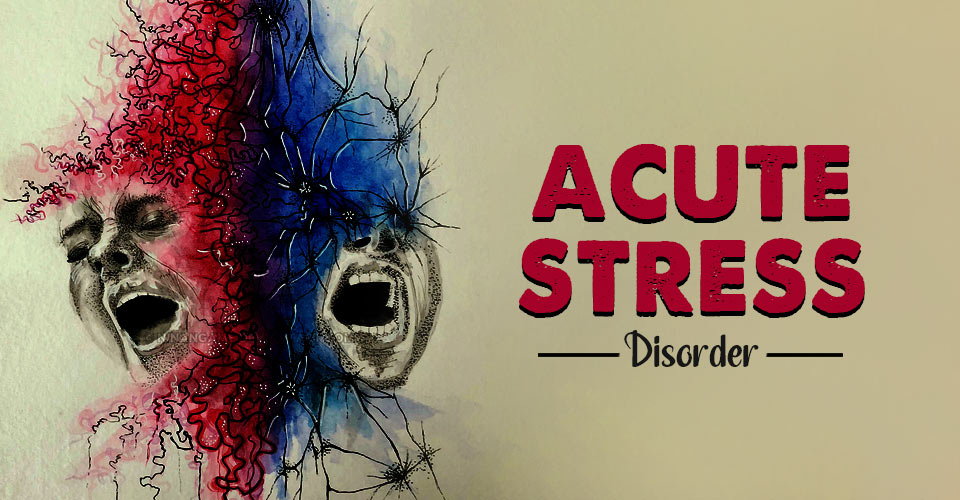
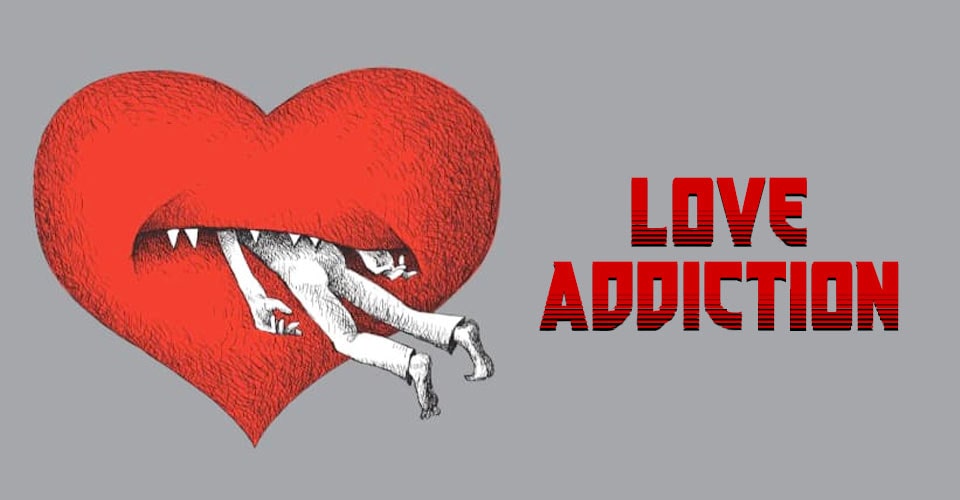
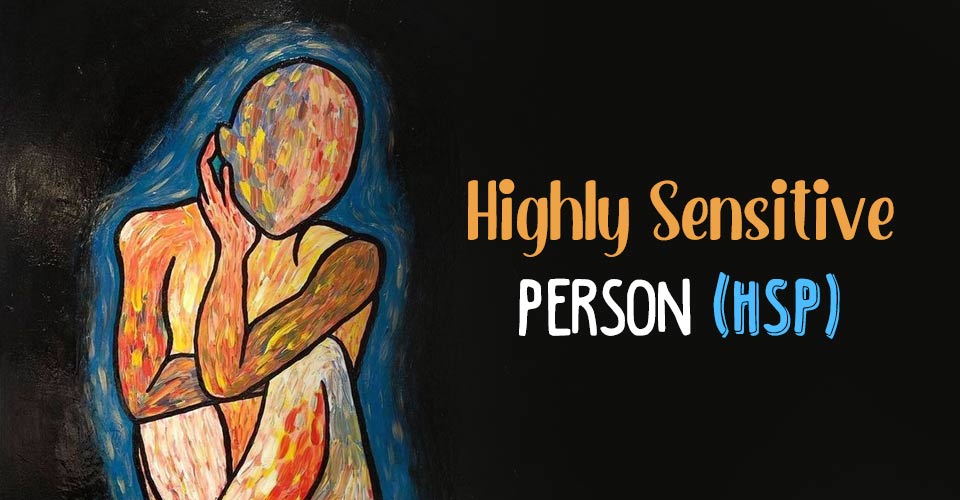

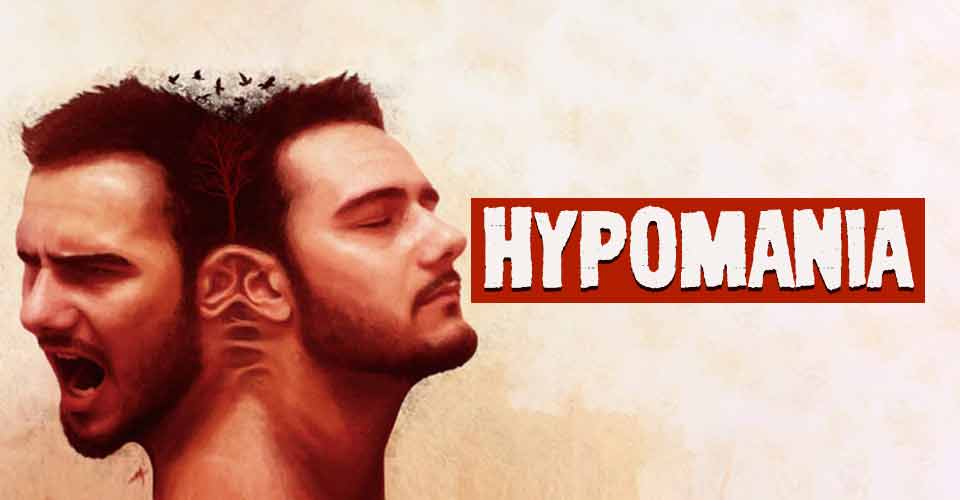



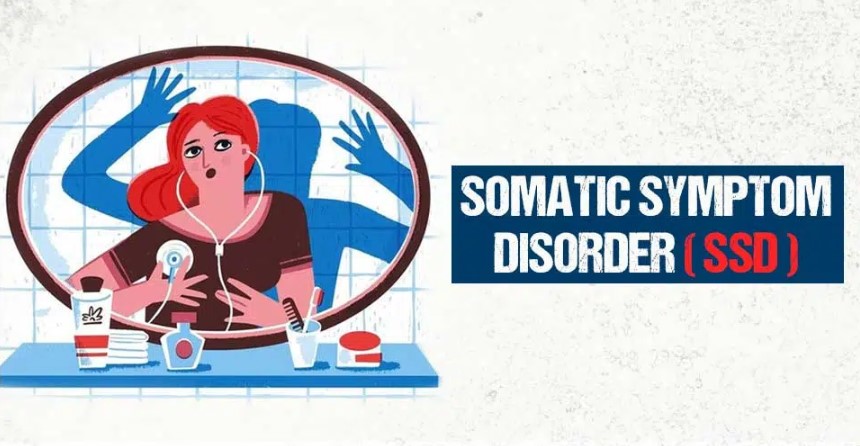

Leave a Reply